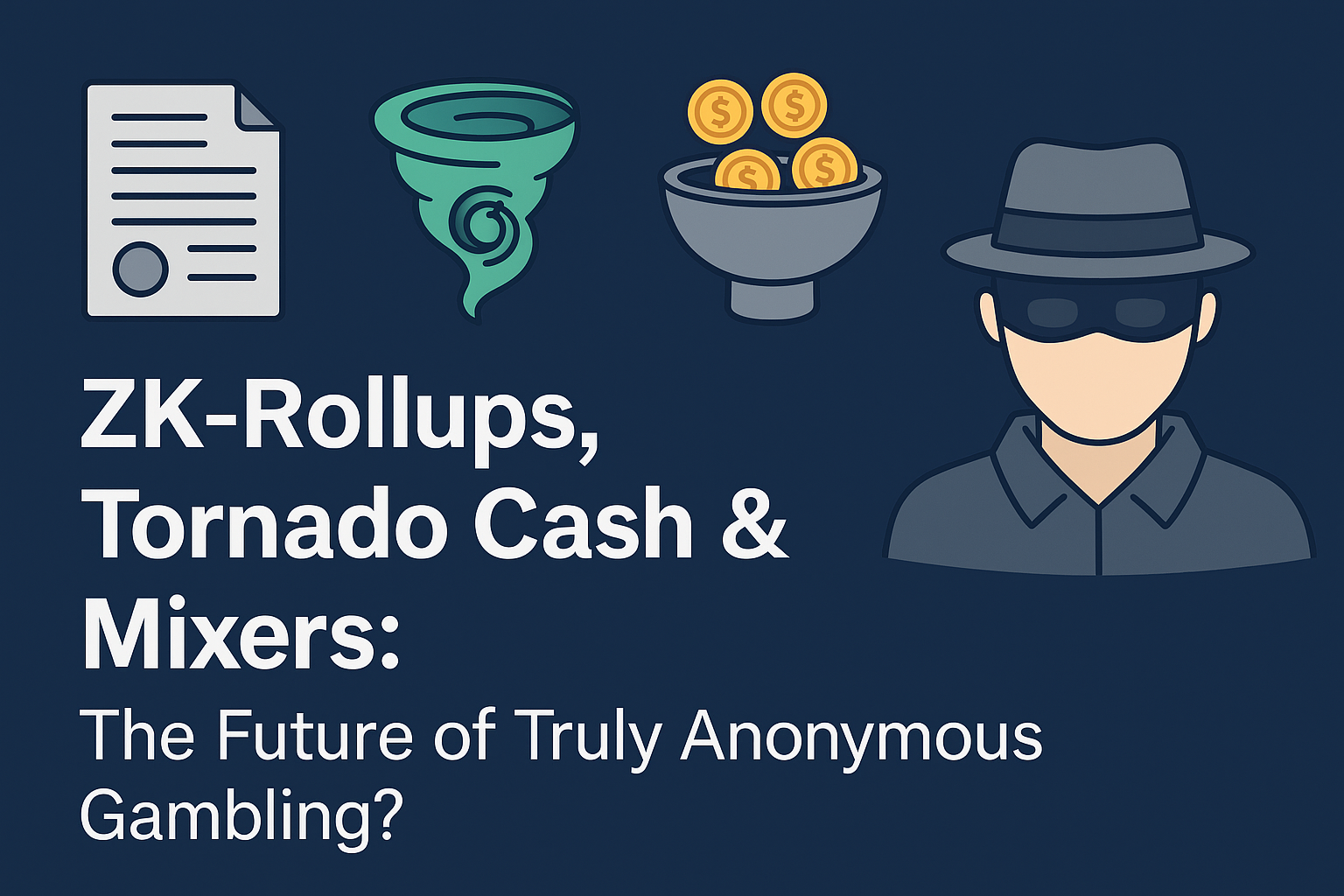In a world where crypto casinos are booming and privacy concerns are rising, players are asking: can you ever be truly anonymous gambling online?
While no-KYC casinos offer a degree of freedom, the blockchain itself remains public and traceable. That’s where privacy tools like ZK-Rollups, Tornado Cash, and crypto mixers enter the conversation. These technologies promise to mask your tracks and redefine what anonymous gambling really means.
Let’s dive into how these tools work, the risks they carry, and whether they truly represent the next evolution in anonymous betting.
The Problem: Blockchain Is Transparent by Design
Cryptocurrencies like Bitcoin and Ethereum are built for transparency. Every transaction is recorded on a public ledger, and while addresses are pseudonymous, blockchain analytics can trace patterns and link them to real-world identities — especially when KYC exchanges are involved.
Even so-called “anonymous” casinos can only protect you at the platform level. The moment you move funds in or out, your wallet becomes part of a visible transaction chain.
So how do you break that chain? This is where advanced privacy tools step in.
Tornado Cash: Obscuring Ethereum Transactions
Tornado Cash is a decentralized protocol on Ethereum that uses a process called zkSNARKs (zero-knowledge proofs) to anonymize transactions.
How it works:
- You deposit ETH into Tornado Cash.
- Your deposit is mixed with others in a smart contract pool.
- You receive a secret note or proof.
- You can later withdraw the same amount to a different wallet — unlinking your input and output.
Benefits:
- No custodial risk (you hold the keys).
- Decentralized and open-source.
- Compatible with major wallets like MetaMask.
Risks:
- Tornado Cash has been sanctioned by the U.S. Treasury.
- Users interacting with it might get flagged by exchanges and other platforms.
- If you withdraw to a KYC exchange, your privacy is compromised anyway.
Mixers: The Old-School Solution to On-Chain Privacy
Crypto mixers (also known as tumblers) predate Tornado Cash. They combine transactions from many users and return the same value — minus a fee — to a different wallet address.
Popular services include:
- Wasabi Wallet (Bitcoin)
- Samourai Whirlpool
- Centralized mixers (now mostly shut down or illegal)
Benefits:
- Obfuscates direct address-to-address links.
- Helps avoid blockchain tracing by grouping transactions.
Drawbacks:
- Centralized mixers carry exit scam risks.
- Many mixers have been shut down or blacklisted.
- Still detectable by advanced blockchain analytics firms.
ZK-Rollups: A Scalable Privacy Breakthrough?
ZK-Rollups are not mixers or privacy tools in the traditional sense — they’re scalability solutions that use zero-knowledge proofs to bundle thousands of transactions off-chain and verify them with a single proof on-chain.
But privacy-focused rollups, like:
- zkSync
- Aztec Network
- Scroll
…are beginning to implement privacy by default using ZK proofs.
Why this matters for gambling:
- If anonymous casinos are built on zk-rollup chains, transactions between players and platforms could be completely private.
- These systems allow for fast, cheap, and invisible interactions.
- Some rollups may even support private smart contracts for anonymous betting pools.
Combining Tools: The Full Stack of Anonymity
The future of anonymous gambling may not rely on a single tool, but a stacked approach:
| Layer | Tool | Purpose |
|---|---|---|
| Network privacy | VPN / TOR | Hides IP and location |
| Wallet privacy | New addresses / stealth wallets | Prevents reuse tracking |
| Transaction privacy | Mixers / Tornado Cash | Obfuscates on-chain links |
| Chain privacy | ZK-Rollups | Enables private smart contracts |
| Platform choice | No-KYC Casinos | Avoids identity collection |
For truly anonymous gambling, players must treat privacy as a strategy, not just a feature.
Legal and Ethical Considerations
While privacy is a right, regulators increasingly see anonymity as a threat. Tools like Tornado Cash are already under scrutiny, and using them may:
- Trigger account freezes on exchanges.
- Result in “tainted” crypto, refused by services.
- Be illegal in some jurisdictions.
Moreover, casinos using these tools might face pressure to restrict access or implement tracking — even if they market themselves as “anonymous.”
What the Future Might Look Like
The rise of decentralized gambling platforms — paired with privacy-preserving technologies — could usher in a new era:
- On-chain casino games played with zero-knowledge proofs.
- Fully private betting pools with no visibility into who bet what.
- Decentralized ID systems that confirm age or region without revealing identity.
In this future, gambling is not just permissionless — it’s invisible.
Final Thoughts
Blockchain anonymity isn’t dead — it’s evolving. ZK-Rollups, Tornado Cash, and mixers are powerful tools that can empower players seeking true privacy, but they come with risks, responsibilities, and limitations.
For those willing to learn and implement the right tech stack, anonymous gambling is not only possible — it’s on the verge of going mainstream.
But in this high-stakes environment, remember: privacy is not a switch — it’s a strategy.

